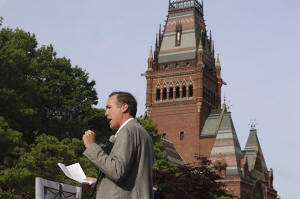Harvard is hoping court rules Trump administration's $2.6B research cuts
were illegal
[July 21, 2025]
By MICHAEL CASEY
BOSTON (AP) —
Harvard University will appear in federal court Monday to make the case
that the Trump administration illegally cut $2.6 billion from the
storied college — a pivotal moment in its battle against the federal
government.
If U.S. District Judge Allison Burroughs decides in the university's
favor, the ruling would reverse a series of funding freezes that later
became outright cuts as the Trump administration escalated its fight
with the nation’s oldest and wealthiest university. Such a ruling, if it
stands, would revive Harvard’s sprawling scientific and medical research
operation and hundreds of projects that lost federal money.
“This case involves the Government’s efforts to use the withholding of
federal funding as leverage to gain control of academic decisionmaking
at Harvard,” the university said in its complaint. “All told, the
tradeoff put to Harvard and other universities is clear: Allow the
Government to micromanage your academic institution or jeopardize the
institution’s ability to pursue medical breakthroughs, scientific
discoveries, and innovative solutions.”
A second lawsuit over the cuts filed by the American Association of
University Professors and its Harvard faculty chapter has been
consolidated with the university's.
Harvard’s lawsuit accuses President Donald Trump's administration of
waging a retaliation campaign against the university after it rejected a
series of demands in an April 11 letter from a federal antisemitism task
force.

The letter demanded sweeping changes related to campus protests,
academics and admissions. For example, the letter told Harvard to audit
the viewpoints of students and faculty and admit more students or hire
new professors if the campus was found to lack diverse points of view.
The letter was meant to address government accusations that the
university had become a hotbed of liberalism and tolerated anti-Jewish
harassment on campus.
Harvard President Alan Garber pledged to fight antisemitism but said no
government “should dictate what private universities can teach, whom
they can admit and hire, and which areas of study and inquiry they can
pursue.”
The same day Harvard rejected the demands, Trump officials moved to
freeze $2.2 billion in research grants. Education Secretary Linda
McMahon declared in May that Harvard would no longer be eligible for new
grants, and weeks later the administration began canceling contracts
with Harvard.
[to top of second column]
|

Ryan Enos, a government professor at Harvard University, speaks at a
protest against President Donald Trump's recent sanctions against
Harvard in front of Science Center Plaza on May 27, 2025, in
Cambridge, Mass. (AP Photo/Leah Willingham, File)

As Harvard fought the funding freeze in court, individual agencies
began sending letters announcing that the frozen research grants
were being terminated. They cited a clause that allows grants to be
scrapped if they no longer align with government policies.
Harvard, which has the nation's largest endowment at $53 billion,
has moved to self-fund some of its research, but warned it can’t
absorb the full cost of the federal cuts.
In court filings, the school said the government “fails to explain
how the termination of funding for research to treat cancer, support
veterans, and improve national security addresses antisemitism.”
The Trump administration denies the cuts were made in retaliation,
saying the grants were under review even before the April demand
letter was sent. It argues the government has wide discretion to
cancel contracts for policy reasons.
“It is the policy of the United States under the Trump
Administration not to fund institutions that fail to adequately
address antisemitism in their programs,” it said in court documents.
The research funding is only one front in Harvard’s fight with the
federal government. The Trump administration also has sought to
prevent the school from hosting foreign students, and Trump has
threatened to revoke Harvard's tax-exempt status.
Finally, last month, the Trump administration formally issued a
finding that the school tolerated antisemitism — a step that
eventually could jeopardize all of Harvard’s federal funding,
including federal student loans or grants. The penalty is typically
referred to as a “death sentence.”
All contents © copyright 2025 Associated Press. All rights reserved
 |